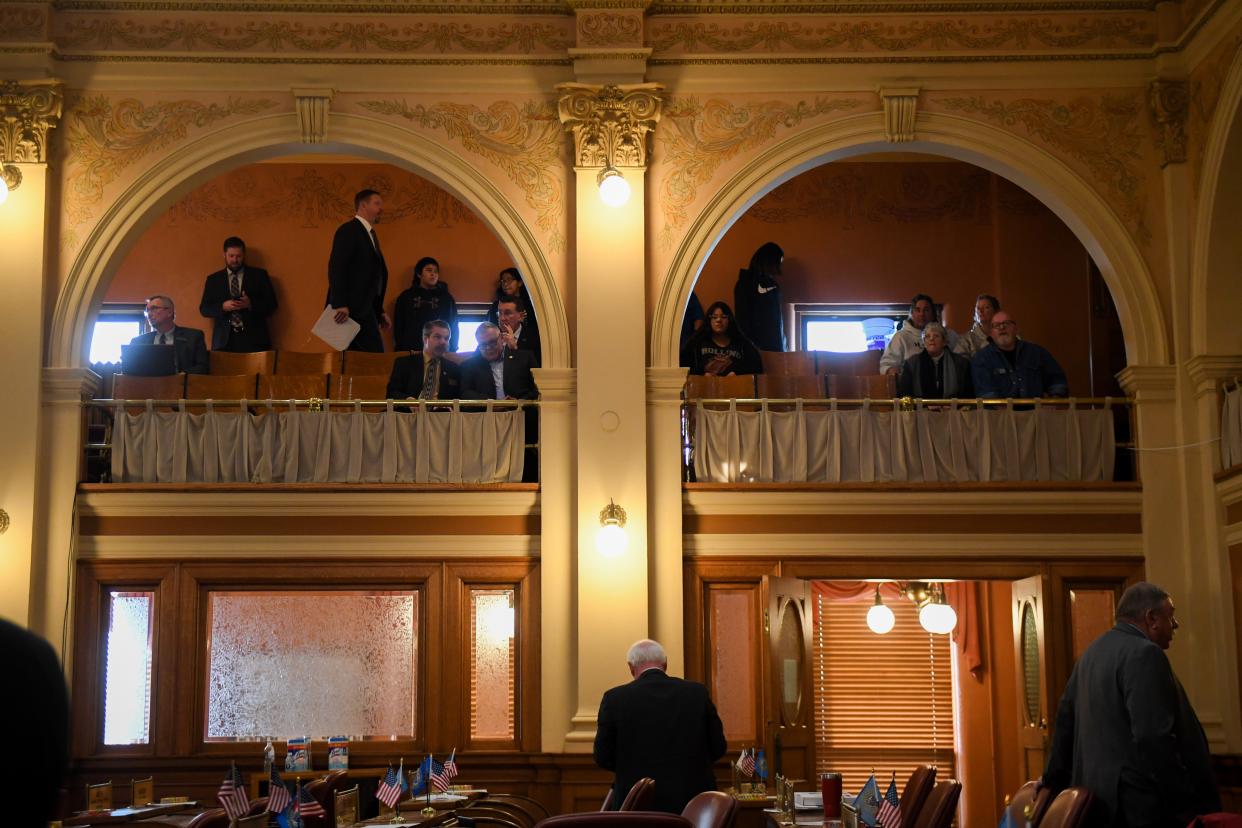Uniform Commercial Code updates back in front of South Dakota lawmakers

- Oops!Something went wrong.Please try again later.
- Oops!Something went wrong.Please try again later.
PIERRE — In a Groundhog Day like fashion, lawmakers picked up where they left off in 2023 after Gov. Kristi Noem vetoed a bill that would’ve added updates to a package of laws that regulate interstate commerce.
Friday morning saw the House State Affairs committee vote to pass two bills related to the Uniform Commercial Code, frequently called “the backbone of American commerce.” The first, HB 1161, which passed unanimously, bans the state from accepting a central bank digital currency (CBDC). The second, HB 1163, which passed with one "no" vote, lets the state accept new updates to the UCC including better defining cryptocurrency.
The UCC came to be in the 1890s as a way to align business transactions between the states, Nathan Sanderson, executive director of the South Dakota Retailers Association, explained. The package of laws aren’t federal and rather each state adopts the UCC so businesses across the country can process checks, certify leases and allow bank deposits.

“As business has evolved, so does the code,” Sanderson said, adding the code had been updated many times since its establishment and that, this time around, the UCC updates allow for recognizing cryptocurrency as a form of money and the usage of e-signatures for financial documentation.
The updates do not allow for a central bank digital currently, doesn’t specify a certain type of cryptocurrency, doesn’t take away physical money, and federal powers don’t expand, Sanderson said.
Last year, the South Dakota Freedom Caucus opposed the UCC update because the group believed it would stifle cryptocurrency competition and open the door for a federal CBDC. Gov. Noem opposed the bill because of how it defined cryptocurrency as money, leading to her veto.
More: South Dakota Native American lawmakers, Gov. Noem renew focus on solutions for reservations
But with work done over the year by many groups, Noem’s office supported the bill Friday, saying that the language wouldn’t damage the economy or limit financial freedom.
Opposition came from Rep. Sue Peterson, R-Sioux Falls, who asked the committee to defer the bill to another day when HB 1199, a similar UCC bill, would be heard. She requested HB 1163 have some surgical edits to address her concerns.
Rep. Jon Hansen, R-Dell Rapids, used his time during the questioning period to ask about specific definitions of items in the UCC such as chattel papers and hybrid transactions. While those were answered by a UCC lawyer, Hansen was displeased that an out-of-state expert had to take on those questions.
“I think that's irresponsible government, subjecting our constituents to a law that the proponents in this state can't explain,” Hansen said, when he explained why he opposed the motion to pass HB 1163. “I think that's embarrassing, frankly.”
More: South Dakota Senate shoots down property tax valuation cap
Many of the lawyers in the room were familiar with the UCC because of the required contract law classes they took while in school, Rep. Will Mortenson, R-Fort Pierre, said. It was disrespectful to doubt their expertise and the thousands of hours that they spent over the past year trying to come up with a solution to the concerns voiced by people about the UCC.
“Make no mistake, this is the product of an intensely scrutinized process, and they are delivering for us an update to the backbone of our commercial law,” the House Majority Leader said.
HB 1163 passed out of committee 12-1 and now heads to the House floor.
This article originally appeared on Sioux Falls Argus Leader: UCC updates head back to SD lawmakers

